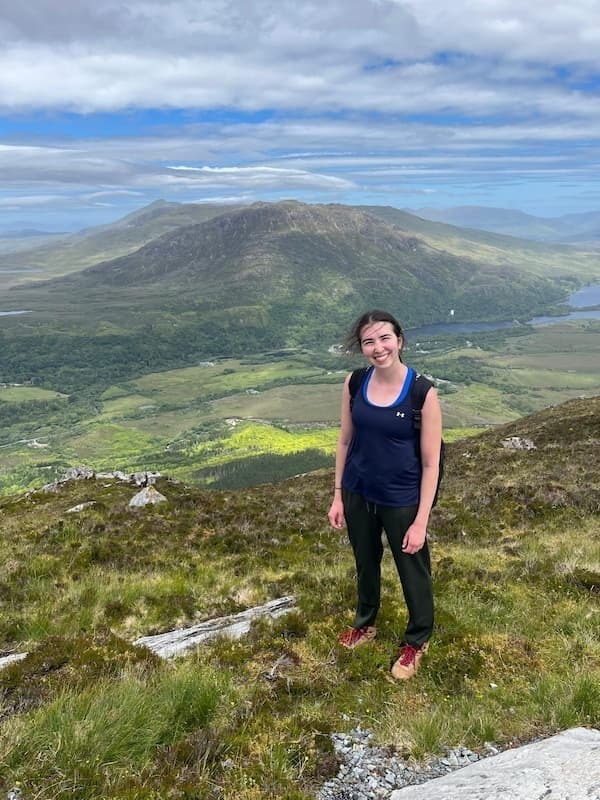A family trip to Ireland inspired Maeve Mastri '26, a neuroscience and behavior major in Notre Dame's College of Arts and Letters, to spend her summer conducting research in Ireland, funded by the Naughton Fellowship REU. Fellowship recipients work closely with faculty and graduate students, collaboratively addressing research challenges and making significant contributions. In this Q&A, Mastri shares how she discovered this opportunity to pursue research abroad, offers advice to incoming students seeking similar opportunities, and reflects on what she has learned along the way.

What I do:
For the past few weeks, I have been conducting research with Dr. Ciara Egan, a professor of Clinical Neuroscience at the University of Galway, for a current project of hers regarding the neurological basis of dyslexia in adults. By utilizing pupillometry techniques and cognitive testing, we are working to better understand how pupil dilation relates to an individual’s ability to phonologically process words and letters. My role in the lab involves recruiting and testing participants as well as organizing and pre-processing the data that we collect from the study.
How I got started:
Last summer, my family and I were staying in Galway and decided to travel to Kylemore Abbey for the day. Little did I know that that decision would lead me to where I am now, as during our visit, I met Lisa Caulfield, the Director of the Kylemore Global Centre, who mentioned to me a research program meant for undergraduate students studying a STEM discipline that takes place in Ireland each summer. This program, the Naughton Fellowship REU, greatly appealed to me given my Irish roots and my interest in pursuing a career in research after graduation, so after hearing about it, I knew that I had to apply. During the application process, Lisa kindly offered me the names of two neuroscience professors conducting research this summer, one of which was Dr. Egan’s name, and after being granted the fellowship, I was assigned to work with Dr. Egan on her research project.
What I’ve learned so far:
My experience thus far has given me meaningful insight into the process of research itself from the challenges that come with recruiting participants for clinical studies to the ongoing task of data collection. This project specifically is being conducted in collaboration with researchers at UCD in order to expand the pool of participants that we can draw from and utilize the data we are collecting to examine the relationship between dyslexia and eye movement beyond just pupil dilation. Through this joint research study, the necessity for clear communication and organization has become apparent along with the power that collaboration serves in giving a research idea the opportunity to come to life. Further, I have been able to grow more familiar with the various computer software applications we use for testing participants and processing our data and have been able to learn much more about dyslexia as a neurodevelopmental disorder.
How my research funding works:
While the Naughton Fellowship REU is an unpaid opportunity, it is a fully-funded program that includes roundtrip airfare, a generous living stipend, accommodation, and relevant commuting costs. Currently, I am living with a few interns in University of Galway accommodation, each of whom is completing an internship this summer as part of the Notre Dame Irish Internship Program. Through these program funds, I have been able to conduct research all while exploring Galway City and the beautiful towns that surround it.
What I love about doing research at Notre Dame:
Notre Dame provides numerous opportunities for undergraduate students to become involved in research whether domestically or internationally. On campus, I am a research assistant for the Development and Psychopathology Laboratory where I have been a part of research projects that have examined the impact that emotional regulation has on the biological and psychological development of children within at-risk populations. As much of the work within the D&P Laboratory takes place at the William J. Shaw Center for Children and Families, it has meant a lot to be able to engage more closely with the South Bend community while learning more about an area of research that I am passionate about. Now having the opportunity to conduct research in Ireland on a completely different topic, I have been able to acquire other research skills and gain insight into the kind of work that I may want to pursue in the future.
Advice for students interested in doing research at Notre Dame:
For those who want to become involved in research at Notre Dame, my biggest piece of advice would be to lean into the connections that you have made so far in your time at Notre Dame and to not be afraid to ask for opportunities. In my experience, people are often willing to give you a chance. Constantly ask questions and seek out mentorship when possible. Consider what you can gain from a research experience not just in regard to the topic of study but also in regard to how it may inform your lifelong learning and personal growth.
Anything else you’d like to add:
Beyond research, I’ve had several opportunities so far this summer to explore the beauty of the west coast of Ireland and learn more about Irish culture by tagging along on the excursions and events that are part of the programming for groups studying abroad in Galway. Going on historical tours, taking a Connemara Irish dance lesson, and hiking nearby mountains are a few things that have provided me with an enriching summer. It’s been such a joy being able to have these experiences!